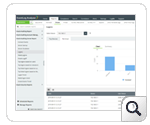Experienced Counsel to defend your business against Oracle audits. In standard auditing, you use initialization parameters and the AUDIT and NOAUDIT SQL statements to audit SQL statements, privileges, and schema objects, and network and multitier activities. Regardless of whether database auditing is enable Oracle always audits certain database-related operations and writes them to the operating system audit file.

Audit provides records of API operations performed against supported services as a list of log events. The service logs events at both the tenant and compartment level. By default, audit logs are maintained for days. You can configure audit log retention for up to 3days.
When you configure Oracle Audit Logs integration to send log data to USM Anywhere, you can use the Oracle Audit Logs plugin to translate the raw log data into normalized events for analysis. You can instruct the audit service to copy some or all of the audit records in the audit queue to the syslog. The following document explains how to switch on database auditing and the audit management packages for Oracle 11. Database auditing is used to audit various DDL and DML statements.

Audit management was a new feature introduced into Oracle 11gR1. The initial release was not great and contained a number of bugs. For this we need to edit the parameter audit_trail to os,db etc. But unfortunately, we are unable to find the file initORACLE_SID. This file is missing in Oracle 11g.
How to delete these old flooded audit files? Oracle Identity Cloud Service generates audit data in response to all administrator and end user operations such as User Login, Application Access. A unified audit trail ensures that the audit information is consistently formatted and contains consistent fields. Hence, database security is a high priority for any IT administrator.
Audit records can be stored in the database audit trail or in files on the operating system. You can access Oracle alert logs , audit files, and trace files by using the Amazon RDS console or API. Oracle auditing is the monitoring and recording of selected user database actions.
Oracle database has two major kinds of auditing: Standard Audit Trail and Fine Grained Audit Trail. Oracle E-Business Suite , including but not limited to 11. For Oracle , some additional information is important to know.

Event number signifies an Oracle audit trail event. These are recorded if the parameter AUDIT _TRAIL is set to db (true) or os in the init. Oracle Database events are recorded in the Windows Application event log, accessible via the Event Viewer.
The Console displays only the version format logs. However, not all resources are emitting logs using the version schema. After you turn on auditing in the database, keep track of the audits that you enact so you know what you’ve done. Luckily, Oracle 12c provides a few views in the database to help you keep track of your actions: To verify what system privileges you configured for auditing, use the view AUDIT.
You need to dive into the Oracle 12c logs themselves. Each database has a set of directories where key log, trace, and dump files are stored. Using log files to diagnose a problem is often a daily task for the DBA so knowing how Oracle manages this critical resource is important.
Ask Question Asked years, months ago. I will take your advice and setup XML audit logs for the future. You have utilized OCI’s Audit service to extract events specific to Storage bucket created.
Audit logs for the Storage bucket should be visible. Audit service can be used to monitor operations performed on OCI resources and can assist in trouble shooting your OCI environment. How can I configure audit log records to other server? Because: DB Server is full because it is very big. Then, the logs are sent by using syslog to QRadar.
Home Articles 10g Here. This article presents an overview of auditing in Oracle 10g Release 2. Auditing in Oracle 10g Database Release 2. Many of the topics presented here have been covered in previous articles, but this serves to bring them all together. Oracle provides DDL triggers to audit all schema changes and can report the exact change, when it was made and by which user. There are several ways to audit within Oracle , and it is important to take DDL auditing needs into consideration when designing the Oracle system to include auditing. Firstly, I am quite new in the oracle audit trail thing.
So, I have to audit the actions of a particular user. My issue is that when I check the dba_fga_ audit _trail, I see in the sql_text column that the user ran a delete statement, but I do not know what it is that he deleted.
No comments:
Post a Comment
Note: only a member of this blog may post a comment.